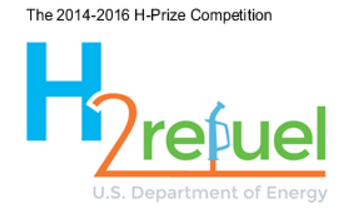The U.S. Department of Energy’s (DOE) Fuel Cell Technologies Office and the Hydrogen Education Foundation (HEF) recently announced the competition finalist SimpleFuel as the winner of the $1 million H2 Refuel H-Prize.
The SimpleFuel team, a consortium made up of Ivys Energy Solutions, McPhy Energy North America and PDC Machines, designed their system to be a safe, small-scale hydrogen-refueling appliance capable of delivering up to 5 kg/day of hydrogen to vehicles at pressures up to 700 bar (10,000 psi) – enough to fully fuel one fuel cell electric vehicle (FCEV) for 300-360 miles.
“In 2007, Congress established this competition, with bipartisan support, to inspire creative approaches and advances for hydrogen energy technologies,” explains Jeff Serfass, HEF president. “The development of the hydrogen infrastructure became the target of this competition, and I am pleased that DOE and HEF together have delivered on the objective for the H-Prize with SimpleFuel’s grand achievement.”
Phase 1 of the competition was launched in 2014, when America’s engineers and entrepreneurs were invited to answer the call to design and build an affordable system for small-scale, non-commercial hydrogen fueling. After receiving and evaluating nine design submissions in 2015, SimpleFuel was selected by an independent panel of judges as the finalist to advance to Phase 2.
SimpleFuel constructed its system in 2016 in Warminster, Pa., followed by a three-month data collection period, which ended in December 2016. During that time, an open house event was held at which the team demonstrated their system by conducting a fueling of a Hyundai Tucson FCEV.
As reported, the National Renewable Energy Laboratory analyzed the data collected during that testing period, and the cost information provided by the team was also independently reviewed. The H-Prize panel of judges deemed that the data collected showed that SimpleFuel’s system met both the technical and cost criteria as outlined in the final competition guidelines.
Still, hydrogen infrastructure remains a critical barrier to the widespread adoption of FCEVs. The future of FCEVs in a consumer environment is dependent upon a widely available network of fueling stations. The H2 Refuel competition was designed to help address this barrier through easily deployed small-scale fueling systems for home and community use to bridge the gap while widespread infrastructure development takes place.
Click here for more information on the H2 Refuel H-Prize.






